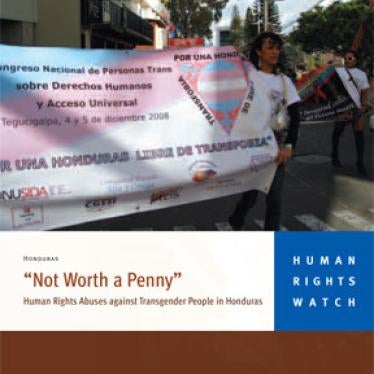The two policemen hustled Joshua roughly into their patrol car. At the station in Tegucigalpa, Joshua and others endured beatings from officers armed with batons. “They also tried to push us down the stairs,” Joshua said. “They called us culeros (faggots).”
Joshua’s offense? Being a transgender sex worker in Honduras. A new report from Human Rights Watch collects compelling evidence that transgender people in that Central American country are victims of chronic mistreatment, especially at the hands of law-enforcement authorities. The report documents police actions against transgender people that violate fundamental human rights protections against torture and cruel, inhuman, and degrading treatment or punishment.
Honduras is a violent society; its murder rate is eight times that of New York City. Transgender people – sex workers and others – are a particular target. At least 17 have been killed in public places in Honduras since 2004; many more have been beaten, stabbed, or shot. None of the murders have been prosecuted.
Honduran police not only disregard crimes against transgender people, but victims and witnesses say the police also commit them. Nearly every transgender person Human Rights Watch interviewed spoke of harassment, beatings, and ill treatment at the hands of police. They reported serious violence – including sexual and physical assault – as well as extortion by members of the Municipal and the National Preventive Police. Transgender people said law enforcement officials failed to investigate these crimes or to prosecute suspects.
The report is based on research conducted over two-week field visits to Honduras in December 2008 and February 2009, as well as prior and subsequent research, including phone interviews. Human Rights Watch conducted in-depth interviews with 35 people who were victims of or witnesses to discrimination and physical violence targeting transgender people. Human Rights Watch interviewed other victims who did not want their stories included in the report for security reasons. Human Rights Watch also spoke with United Nations officials, human rights leaders, activists, academics, and Honduran government officials. The government officials denied that transgender people were victims of police brutality and neglect.
Transgender sex workers are particularly vulnerable to police abuse. The sex trade is legal in Honduras, and many transgender people work in it because other forms of employment are closed to them. Police harassment is endemic. Eighteen-year-old Paola told a Human Rights Watch researcher that on a night in 2008: “four police officers told me to get in the patrol car. They started to beat me and asked me to have sex with them. They wanted me to give them all an oral. I refused. They drove me to the road that exits the city in the south and they beat me senseless and threw me there and left. They were wearing police uniforms. I have seen them before but I don’t know their names because they concealed their badges.”
Honduran law is stacked against people like Paola. The report found that it gives police wide latitude to arrest those who disturb “public morality and proper conduct.” The lack of a clear distinction between what is permitted and what is not, combined with the widespread stigma against transgender people in a traditionally macho Central American society, allows police nearly free rein to mistreat transgender people.
The result: “The community is terrified,” Indyra Mendoza, a lesbian activist, told Human Rights Watch. Transgender people in Honduras “do not trust the police or the judicial system.”
Fact File
- At least 17 transgender people have been killed in public places in Honduras since 2004; many more have been beaten, stabbed, or shot. No one has been prosecuted for any of the 17 deaths.
- Approximately 90 percent of all violations by the Honduran police are not investigated, other research has found.
- In June 2008, Honduras supported a Resolution on Human Rights, Sexual Orientation, and Gender Identity unanimously adopted by the General Assembly of the Organization of American States.
Recommendations







